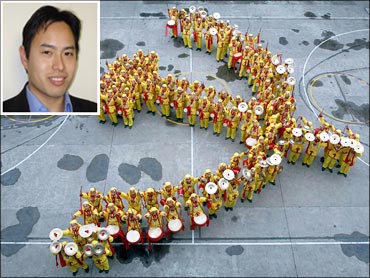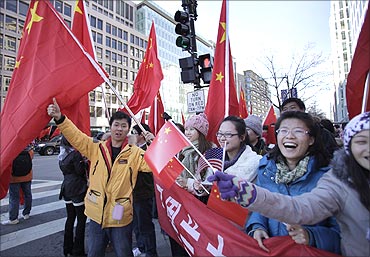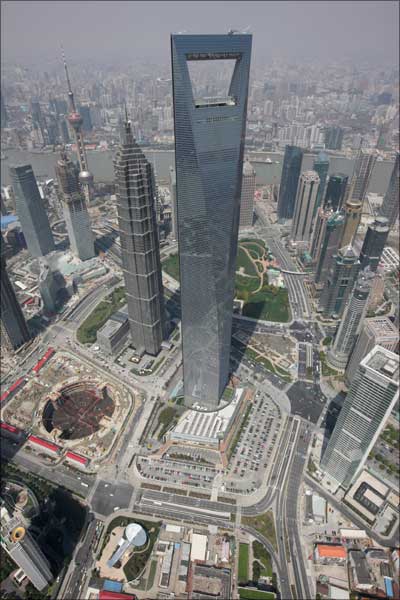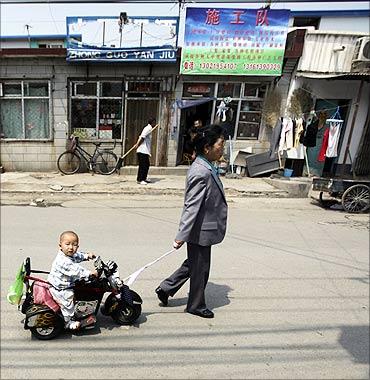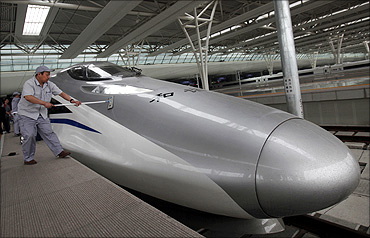 | « Back to article | Print this article |
'I see a deepening of mistrust and strategic competition between India and China'
Few people who predict a country's inevitable failure get respect from that country's political leadership. Dr John Lee, Visiting Fellow, Hudson Institute and Director of Foreign Policy, at Centre for Independent Studies, Sydney, is an exception, though.
Despite Dr Lee's Will China Fail (published in 2007) -- a scathing critique of how unsustainable socio-economic model of market socialism in China will prove to be its failure -- the Chinese Communist Party (CCP), that controls the levers of economic and military might in China, and has been renowned for its brutal suppression of political discord, takes him seriously.
"The Chinese government actually accepts that this model of growth is unsustainable but is finding it next to impossible to stop local officials and local branches of state-owned banks from continuing to pour money into unprofitable ventures," he says in an e-mail interview in a way underlining that the CCP has been hijacked by vested interests that is beyond its control.
He also predicts that as India and China compete with each other in their quest for mineral assets and spreading influence in the resource-rich African content the mistrust and strategic competition between the two Asian giants will deepen in the decades to come by.
Click NEXT to read on . . .
'I see a deepening of mistrust and strategic competition between India and China'
What exactly do you mean by China's failure? It's disintegration like the Soviet Union?
No, I don't expect disintegration. I am referring to the failure of the Chinese authoritarian model to sustainably promote, both, economic growth and domestic stability.
Dr Lee, why in your view would China fail? Could you elaborate on the social, economical and political factors that will contribute to this failure if not complete disruption of the Chinese society?
China's state-led authoritarian model of growth benefits a minority of well-connected insiders and structurally prevents the majority of Chinese citizens from sharing in the country's wealth.
China has now become the most unequal society in all of Asia in terms of distribution of income and wealth. Because so much of the country's resources are reserved for the state-owned sector, there is systematic suppression of the private domestic sector.
For example, the state-sector received over three quarters of all the country's capital while the most lucrative and important sectors of the economy are reserved for SOEs (State-operated enterprises).
This means that only those with close links to the CCP (Chinese Communist Party) or the SOE sector tend to benefit.
As an indication, the wealth of the state sector has been rising at around 15-20 per cent a year while household incomes have been rising by maybe 3 per cent each year over the past decade.
Click NEXT to read on . . .
'I see a deepening of mistrust and strategic competition between India and China'
You believe that high fixed investments, high debt to GDP ratio and high unsold housing stocks in the Chinese economy are unsustainable. What gives confidence to the Chinese government to think otherwise and keep ratcheting up this growth?
The Chinese government actually accepts that this model of growth is unsustainable. It is more the case that Beijing is finding it next to impossible to stop local officials and local branches of state-owned-banks from continuing to pour money into unprofitable ventures.
These local governments depend on the revenue that comes from local SOEs pursuing this high-growth, but highly inefficient, approach.
What in your opinion are "the frightening aspects of China's growth" and how do you think will these impact the global economy as well as foreign policy?
First, global markets are looking at China as the primary growth market in the world. Should the Chinese model falter, there will be a huge psychological effect on global economic confidence although this will eventually pass.
Second, in terms of foreign policy, China's State-dominated model means that there is a disproportionate amount of resources in the hands of the State and the government.
This creates a combination of a strong and rich state (with a rapidly growing defence budget) overseeing a country with a weak civil society and poor people.
Nationalism has been used as a 'glue' to enhance the legitimacy of the Chinese Communist Party. This is a potentially unpredictable scenario.
Click NEXT to read on . . .
'I see a deepening of mistrust and strategic competition between India and China'
During your lecture at the Observer Research Foundation on June 14, you noted that the Chinese middle class is the biggest beneficiary of China's growth and this class will be most opposed to any change in the Chinese political system. What's the size of this middle class and what kind of vested interests does it have in maintaining the status quo in China?
The size of the middle class is anywhere from 50 to 200 million people depending on how you define the term. To get ahead in Chinese society, close links with the CCP is generally required.
Hence, those who benefit tend to be those who are the strongest supporters of the CCP.
As an indication, over 3/4 (75 per cent) of CCP members are urban elites.
Do you see a dramatic change or gradual change in the Chinese political system itself and its citizens in the near future? If yes, then what will cause this dramatic/gradual change?
This will only occur when economic growth slows.
Can you tell us what lies beneath China's growth as you also observed during your lecture that China's growth was not "peaceful"?
My comment was that China's rise is unpredictable and un-transparent; not that it is not peaceful.
Click NEXT to read on . . .
'I see a deepening of mistrust and strategic competition between India and China'
You authored Will China Fail in 2007? What kind of changes do you think China has undergone in these four years? Did you anticipate these changes when you set about to write this book?
There has been very little change in policies, and therefore few changes in the Chinese political-economy or society since 2007.
What makes you think that China's current model of development is failing or you predicted in your book that it will fail?
The growth model they have is unsustainable even by the admission of China's leaders. Changing the model will require the CCP to release its grip on economic power which will be difficult.
What do you think will it take for China to move away from a possible disaster as you feel it is headed towards? What corrective measures do you suggest?
The CCP has to release its grip on economic power in the country.
Click NEXT to read on . . .
'I see a deepening of mistrust and strategic competition between India and China'
In the recent past India and China have been facing off each other in Asia and Africa in their quest to secure oil and mineral assets as well as to build critical social and industrial infrastructure in the African continent. In this context, given that China is considered the Big Brother in Asia what should India worry about more: China's military might or economic might?
The two are related since economic might underpins military might. Normal economic competition for resources and markets is normal and unavoidable. It is whether China and/or India will compete according to defined rules.
Also, in the recent past China has been trying to encircle India. Some examples being the building of naval ports in Gwadar in Pakistan and Hambantota in Sri Lanka. China also supports the Maoists in Nepal as well as the Junta in Myanmar. In this scenario how do you think will the Sino-Indian relationship pan out in the coming decades?
I see a deepening of mistrust and strategic competition between the two countries, even if trade between them deepens.
